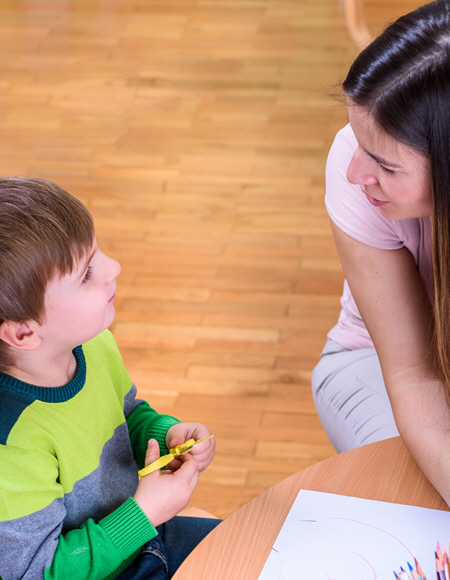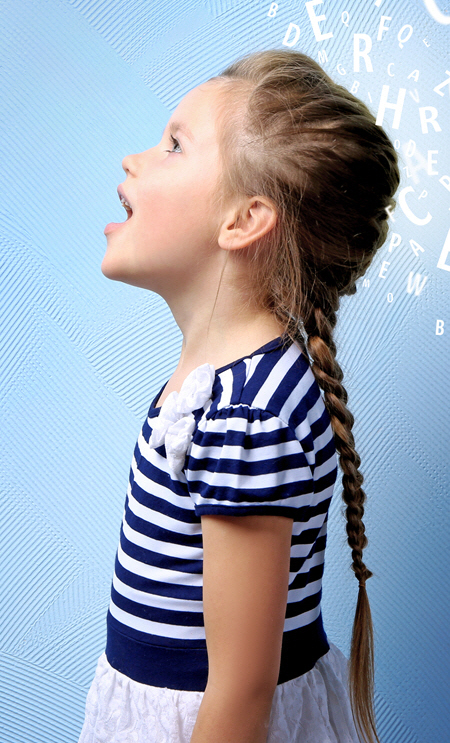Matthew* is a 6-year-old first-grader. He’s very chatty and loves to socialize with kids and adults. He loves telling stories and talking about his weekend adventures with mom and dad.
However, his speech intelligibility isn’t very clear. Mom has gotten used to his speech patterns and is able to figure out his words, so she often has to interpret Matthew’s stories and comments to other friends and family members.
 This is what I mean by a phonological disorder…
This is what I mean by a phonological disorder…
A phonology disorder occurs when your child has trouble figuring out the patterns of using correct speech sounds. When kids break the rules of expected speech patterns, their speech intelligibility can be severely affected.
For example, your child may drop all sounds at the ends of words regardless of what the sound is. So, the word “bed” becomes be-, “hat” becomes ha-, “pop” becomes po-. When you prompt your child to say all his letter sounds by itself, he has no problem doing it. But saying it in words is a challenge.
Another common phonology disorder is something called stopping of continuant sounds. These continuant sounds are produced with a stream of air like S, Z, F, and Z. However, a child may simplify it by putting the brakes on that sound and saying things like: “doo” for zoo, “tun” for sun and “pish” for fish.
There are numerous phonological processes that a child may exhibit. These are just a couple of common examples that I see in my clients.
Sometimes a phonology disorder is hard to discern at first.
Many kids have abnormal or “incorrect” speech early on in development, but that doesn’t mean that they have a phonological disorder. As children grow, their speech becomes more and more intelligible. When a child continues to use these phonological processes for much longer than we would like, it is time to intervene and offer them the help needed to improve their speaking skills.
The following ways that a child says these words are acceptable up to a certain age. It’s when it lingers for a little too long, that speech intervention is needed.
Saying “wewo” for yellow…
Saying “wabbit” for rabbit…
Saying “hay-yuh” for hair…
 The key is a proper assessment.
The key is a proper assessment.
Regardless of the phonological processes your child may have, it is the intervention and the therapeutic help that will guide your child to using intelligible speaking skills.
On the bright side, kids with a phonology disorder typically have fully functional mouth structures. Their lips, tongue, palate, jaw, nasal cavity, and dentition are performing just fine.
Kids with a phonology disorder have trouble following the rules of putting words together.
In contrast to an articulation assessment that looks at the motor aspects of speech (use of the oral structures like your tongue, lips, palate, etc.), phonology deals with the sound patterns of a language. A phonology assessment looks at the linguistic components of forming words.
A typical phonology assessment will look at how your child pronounces his words. As his pronunciation style is recorded during the assessment, a pattern will start to emerge.
At that point, we can determine how to help your child work on the phonological components of speech. Your child may have just a couple of phonology processes occurring in his speech or he may have several. Obviously, the more processes your child exhibits, the more unintelligible his speech may be.
 Helping your child be able to communicate clearly…
Helping your child be able to communicate clearly…
My sessions with your child will include a lot of listening games and how to fine-tune their awareness of speech sounds.
Kids with a phonology disorder may be oblivious to the difference in sounds in words even though they can pronounce individual phonics sounds when told to do so. For example, a child can very easily produce a K sound. But when he is told to say “bike” it will come out as “bi-” as he drops ending sounds all the time. Therefore, listening games are used to improve speech sound awareness and discrimination.
Let’s get the help your child needs right away.
When it comes to speech intelligibility and pronunciation skills, kids can make tremendous progress the earlier we work on those troublesome skills.
Contact me for a free 20-minute consultation so that we can discuss your child’s needs: (720) 808-0450. We will talk about whether I’m the right therapist for your child. A good fit makes therapy way more fun for everyone.
Let’s equip your child with the speech skills he needs for success.

